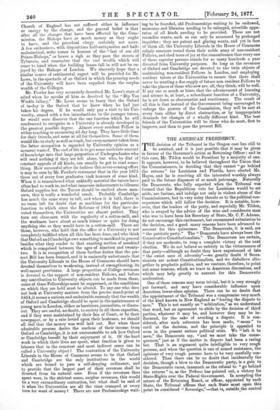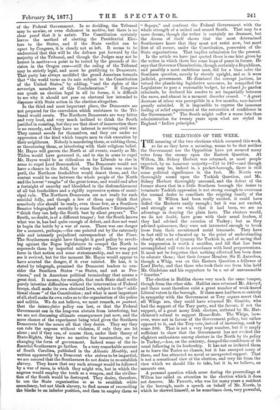THE AMERICAN PRESIDEIsTCY.
THE decision of the Tribunal in the Oregon case has still to be awaited, and it is just possible that it may be given in favour of the Governor's action as Returning Officer ; and in
this case, Mr. Tilden would be President by a majority of one. It appears, however, to be believed throughout the Union that the Commissioners, in deciding that they cannot "go behind the returns" for Louisiana and Florida, have elected Mr. Hayes, and he is receiving all the interested worship always paid to the future dispenser of so much patronage. Naturally the Democrats, who fully expected when the Tribunal was formed that the Republican vote for Louisiana would be set aside, are furious, and indulge not only in violent abuse of the Commissioners, but in very noisy threats as to the political con- sequences which will follow the decision. It is notable, how- ever, that the leaders of the party, and especially Mr. Tilden, who is swayed by the advice of the wise and considerate man who was to have been his Secretary of State, Mr. C. F. Adams, do not encourage this excitement, but recommend submission to the decision, and a good many reasons have been advanced to account for this quiescence. The Democrats, it is said, are "the patriotic party." The "Democrats have always been the Conservative Constitutionalists." The Democrats are certain, if they are moderate, to reap a complete victory at the next election. We do not believe so entirely in the virtuousness of that party—although no doubt they have experienced of late "the sweet uses of adversity"—we greatly doubt if Seces- sionists are ardent Constitutionalists, and we disbelieve alto- gether in prophetic politics, and we venture, therefore, to point out some reasons, which we trace in American discussions, and which may help greatly to account for this Democratic moderation.
One of these reasons may seem trivial, but it is very strongly put forward, and may have considerable influence upon American lower-class opinion. There can be no doubt that the appointment of the Tribunal was a compromise very much of the kind known in New England as "leaving the dispute to men." This is not exactly an "arbitration," as we understand that word, but an agreement to abide by the decision of third
parties, whatever it may be, and however they may be in- fluenced, for the sake of avoiding a dispute. It is con- sidered, after such reference has been made, " mean " to cavil at the decision, and the principle is appealed to even in the present serious political crisis. We "left it to men," the Democrats say, "and we must take the conse- quences," just as if the matter in dispute had been a racing bet. That is an argument quite intelligible to very rough persons, and when the question is one of armed resistance, the opinions of very rough persons have to be very carefully con- sidered. Then there can be no doubt that incidentally the decision, though a blow to the Democratic party, is a gain to the Democratic cause, inasmuch as the refusal to "go behind the returns" is, as the Tribune has pointed out, a victory for State-Rights over the Federal Government. In accepting the return of the Returning Board, or officer, appointed by each State, the Tribunal affirms that each State must upon this point be considered "Sovereign,"—that is, outside_tb.e control
of the Federal Government. In so deciding, the Tribunal may be unwise, or even dishonest in motive, but there is no clear proof that it is unfair. The Constitution certainly leaves the method of electing the Presidential Elec- tors to the States, and if the State verdict can be upset by Congress, it is clearly not so left. It seems to be understood that this will be the defence put forward by the majority of the Tribunal, and though the Judges may not be honest in motive—a point to be tested by the grounds of de- cision in the Oregon case—still the ruling of the Tribunal may be strictly legal, and must be gratifying to Democrats. That party has always modified the grand American formula that "the world turns on its axis subject to the Constitution of the United States," by adding, "and the rights of the sovereign members of this Confederation." If Congress can quash an election legal in all its forms, it is difficult to see why it should not pass an electoral law intended to dispense with State action in the election altogether.
In the third and most important place, the Democrats are not prepared for the convulsion which resistance to the Tri- bunal would create. The Northern Democrats are very bitter and very loud, and very much inclined to think the South justified in resisting, but they see that short of insurrection there is no remedy, and they have no interest in reviving civil war. They cannot secede for themselves, and they are under no oppression of the kind which tempts men to risk execution by their neighbours. Nobody is murdering them, or robbing them, or threatening them, or interfering with their religious belief. Mr. Hayes will govern the North at all events, exactly as Mr. Tilden would have governed it, and to rise in arms to expel Mr. Hayes would be as ridiculous as for Liberals to rise in arms to expel Lord Beaconsfield. The Democrats would not have a chance in the field, for when the Union was once in peril, the Northern freeholders would desert them, and the contest would be one between the whole people of the North and the lowest " roughs " of the great towns, and would end after a fortnight of anarchy and bloodshed in the disfranchisement of all but freeholders and a rigidly repressive system of muni- cipal rule. The Northern Democrats are not ready for such suicidal folly, and though a few of them may think that somebody else should be ready, even those few, as a Southern Senator telegraphed recently to some Southern "Extremists," "think they can help the South best by silent prayers." The South, no doubt, is of a different temper; but the South knows what war is, has had quite enough of defeat, and does not want to begin the battle by a war of races. There was one danger for a moment, perhaps,—the one pointed out by the extremely able and intensely prejudiced correspondent of the Times. The Southerners might have thought it good policy by revolt.. ing against the Bogus legislatures to compel the North to supersede them by impartial military rule. There was great force in that notion and some statesmanship, and we may yet see it revived, but for the moment Mr. Hayes would appear to have averted the danger, if it ever existed. He has, it is stated by telegraph, promised the Democrat leaders to con- sider the Southern States "as States, and not as Pro- vinces," and in American political terminology that means a great deal. It means, for example, that each State shall settle purely intestine difficulties without the intervention of Federal troops, shall make its own electoral laws, subject to the" addi- tional clause" of the Constitution ; and what is most important of all, shall make its own rules as to the organisation of the police and militia. We do not believe, we must remark, en passant, that the laissez-faire policy can last, or that the Federal Government can in the long-run abstain from interfering, but we are not discussing ultimate consequences just now, and the mere chance of the experiment being tried gives the Southern Democrats for the nonce all that they desire. They say they can rule the negroes without violence, if only they are let alone ; and if they can, of course then, under their theory of State-Rights, they have no motive for insurrection, or for changing the form of government. Indeed some of the in- fluential Southerners go farther. In a very remarkable account of South Carolina, published in the Atlantic Monthly, and written apparently by a Democrat who strives to be impartial, we are assured that the Southerners do not desire to re-establish slavery. They know that any such attempt would be followed by a war of races, in which they might win, but in which the n.egroes would employ the torch as a weapon, and the civilisa- tion of the South would be destroyed. They desire, therefore, to use the State organisation so as to establish white ascendancy, but not black slavery, to find means of reconciling the blacks to an inferior position, and then to employ them as
" Sepoys," and confront the Federal Government with the whole strength of a united and armed South. That may be a mere dream, though the writer is certainly no dreamer, but the dream of itself shows that the most determined Southerners know that they must not resist now, but must first of all secure, under the Constitution, possession of the State organisations. That implies submission for the present.
In the article we have just quoted there is one hint given by the writer in which there lies some hope of peace in future. He says that Governor Chamberlain, though certainly a Republican, and possibly a most ambitious man, did for a time solve the Southern question, merely by sternly upright, and as it were judicial, government. He dismissed the corrupt justices, he vetoed the plundering legislative measures, he compelled the Legislature to pass a reasonable budget, he refused ;to pardon criminals, he declared his resolve to act impartially between the races, and almost in a moment disorder ceased. "A great decrease of crime was perceptible in a few months, race-hatred greatly subsided. It is impossible to express the immense feeling of relief experienced at the restoration of confidence in the Government." The South might suffer a worse fate than administration for twenty years upon what are styled in England "Indian principles."



































 Previous page
Previous page